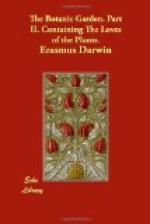I.
“Sweet ECHO! sleeps thy vocal shell,
“Where this high arch o’erhangs the dell;
“While Tweed with sun-reflecting streams
“Chequers thy rocks with dancing beams?—
[Ovena. l. 73. Oat. The numerous families of grasses have all three males, and two females, except Anthoxanthum, which gives the grateful smell to hay, and has but two males. The herbs of this order of vegetables support the countless tribes of graminivorous animals. The seeds of the smaller kinds of grasses, as of aira, poa, briza, stipa, &c. are the sustenance of many sorts of birds. The seeds of the large grasses, as of wheat, barley, rye, oats, supply food to the human species.
It seems to have required more ingenuity to think of feeding nations of mankind with so small a seed, than with the potatoe of Mexico, or the bread-fruit of the southern islands; hence Ceres in Egypt, which was the birth-place of our European arts, was deservedly celebrated amongst their divinities, as well as Osyris, who invented the Plough.
Mr. Wahlborn observes, that as wheat, rye, and many of the grasses, and plantain, lift up their anthers on long filments, and thus expose the enclosed fecundating dust to be washed away by the rains, a scarcity of corn is produced by wet summers; hence the necessity of a careful choice of seed wheat, as that, which had not received the dust of the anthers, will not grow, though it may appear well to the eye. The straw of the oat seems to have been the first musical instrument, invented during the pastoral ages of the world, before the discovery of metals. See note on Cistus.]
II.
“Here
may no clamours harsh intrude,
No
brawling hound or clarion rude;
85 Here no fell beast of midnight prowl,
And
teach thy tortured cliffs to howl!
III.
“Be
thine to pour these vales along
Some
artless Shepherd’s evening song;
While
Night’s sweet bird, from yon high spray
90 Responsive, listens to his lay.
IV.
“And
if, like me, some love-lorn maid
“Should
sing her sorrows to thy shade,
“Oh,
sooth her breast, ye rocks around!
“With
softest sympathy of sound.”
95 From ozier bowers the brooding Halcyons peep,
The
Swans pursuing cleave the glassy deep,
On
hovering wings the wondering Reed-larks play,
And
silent Bitterns listen to the lay.—
Three
shepherd-swains beneath the beechen shades
100 Twine rival garlands for the tuneful maids;
On
each smooth bark the mystic love-knot frame,
Or
on white sands inscribe the favour’d name.




